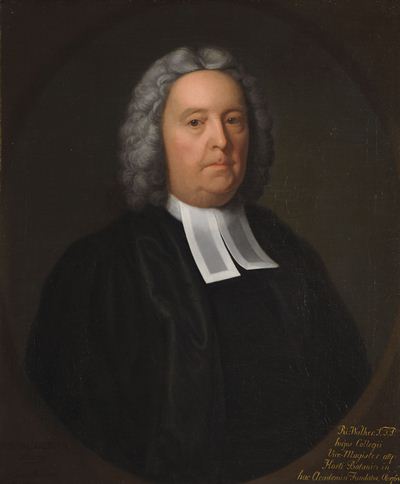Richard Walker
1679-1764
Richard Walker, born in the North Riding of Yorkshire, was admitted to Trinity as a sizar in 1703. He became a scholar in 1706; took his MA in 1710, his BD in 1724 and DD in 1728. He became a Fellow in 1709. He was ordained in1707/13 and held the curacy of Upwell, Norfolk, before becoming Vicar of Chesterton, Cambridgeshire, in 1728; Rector of Fakenham, Norfolk, 1745-58; and Rector of Upwell and Outwell, Norfolk, until 1764.
He became Vice-Master of Trinity in 1734, following the resignation of John Hacket over the Bentley scandal. He supported the Master, Richard Bentley, throughout his quarrel with the Fellows. In particular, he refused as Vice-Master to act on the sentence passed by the College Visitor, the Bishop of Ely, to deprive Bentley of his post. He was Knightbridge Professor of Moral Philosophy, 1744-64.
Walker was an enthusiastic gardener, and especially interested in growing exotics in his small garden in Trinity, where his hothouse displayed banana, coffee, pineapple, and many other fashionable foreign plants. He clearly felt that the University lacked a garden and associated regular botanical instruction, and on 16 July 1760 purchased a 5 acre plot of land, including the ‘Mansion House’ to provide lecture rooms, on a central site on which an Augustinian friary had once stood; he conveyed this land to the University on 25 August 1762 in trust ‘for the purpose of a public Botanic Garden’. In a pamphlet by him published anonymously in 1763 and entitled A Short Account of a Late Donation of a Botanic Garden to the University of Cambridge, Walker made clear his design, referring to the fact that ‘we have generally had titular Professors of Botany, but nothing worth mentioning left behind them’, and the first ‘Statute or order’ of his new garden states that ‘by making use of the plants grown there, trials and experiments shall be regularly made and repeated, in order to discover their virtues, for the benefit of mankind’. In contrast, he states: ‘Flowers and Fruits must be looked upon as amusements only; though, as these do not want their excellences and uses, they need not be totally neglected’.
Unfortunately, Walker's death in 1764 cut short his enthusiastic promotion of the new garden, but his bequest provided for two salaried posts, a reader on plants and a curator; to the first of these posts he appointed Thomas Martyn, who had just succeeded his father John Martyn as Professor of Botany; the curator's post was filled by Charles Miller, brother of Philip Miller, curator of the Chelsea Physic Garden. The ‘Walkerian garden’, inside which the University built its first scientific laboratory in 1787, laid the foundation for the great development of science on the New Museums Site between Bene't Street and Downing Street. His name is perpetuated in the Walkerian Society run by the horticultural students in the botanic garden on its present site.
Walker died on 15 December 1764, unmarried, in Cambridge. In his will he left £10 per annum for one or more poor scholars, and a farm at Swavesey subject to the payment of £50 a year to the Botanic Garden; he also gave many books to the library.
Venn/DNB/Cooper
Richard Walker
|
|
|
|
PREVIOUS SHIELD |
|
NEXT SHIELD |
| Shield Gallery | Sculpture Gallery |
Brass Gallery | Statue Gallery | Interment &Tombstone Gallery | War Memorial Gallery |
